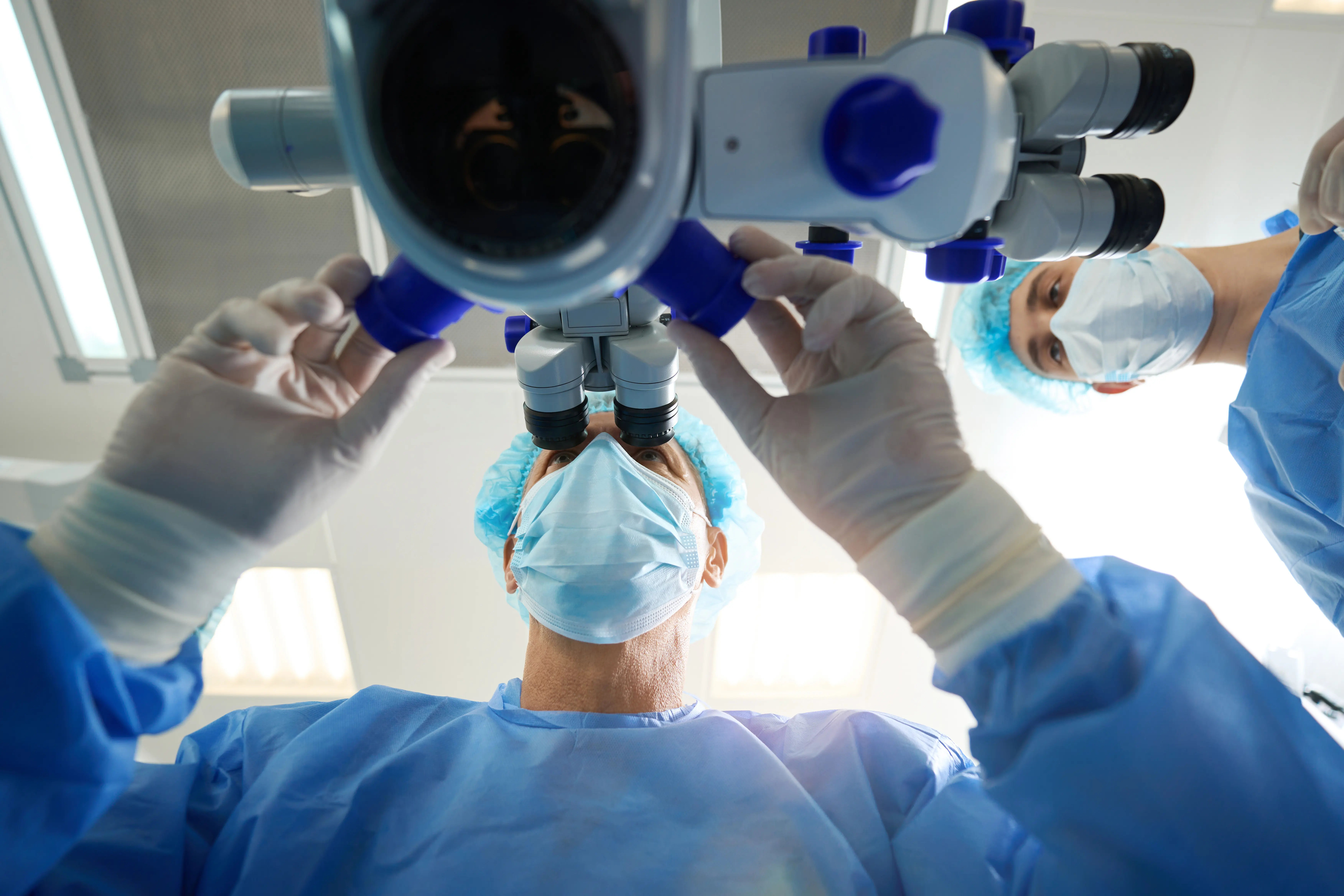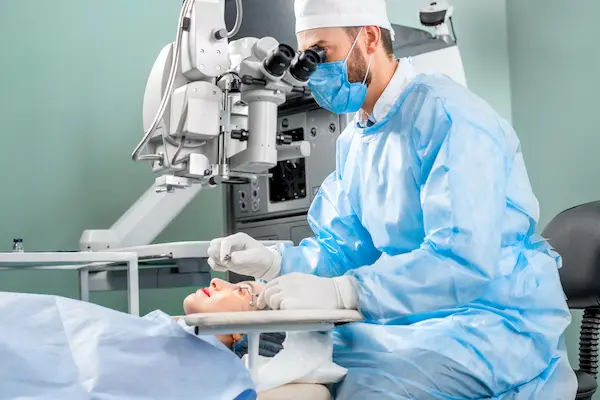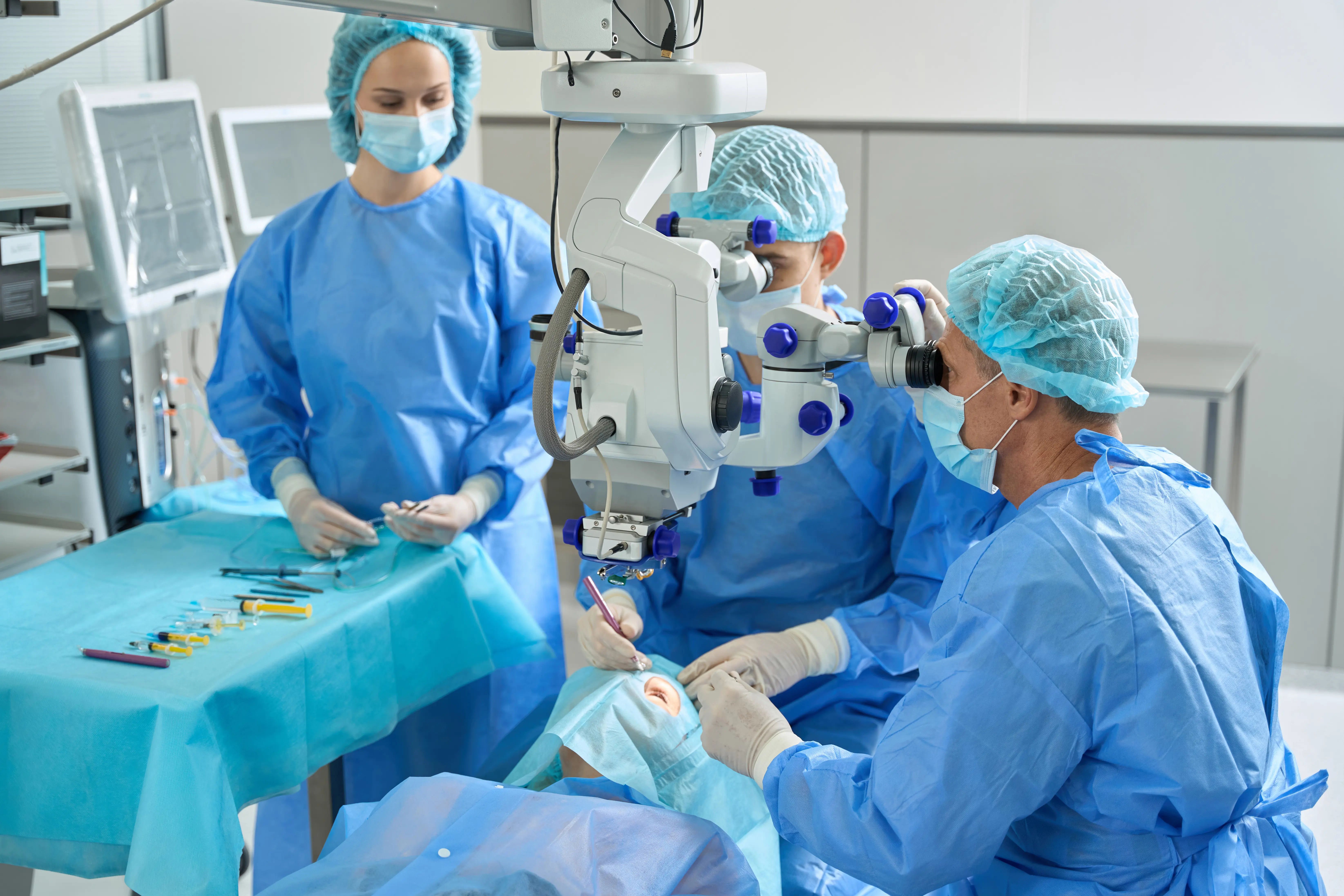Difference Between Cataract And Laser Eye Surgery
Understand the key differences between cataract surgery and laser eye surgery (LASIK). Learn what each procedure treats, how they work, and which is suitable for your vision needs.

Written by Dr.Sonia Bhatt
Last updated on 13th Jan, 2026

Introduction
When it comes to eye surgeries, two common procedures often discussed are cataract surgery and laser eye surgery. While both aim to improve vision, they address different eye conditions and work in distinct ways. If you're considering eye surgery or have been advised to undergo one, understanding these differences can help you make an informed decision.
What Is Cataract Surgery?
What Is a Cataract?
A cataract is a clouding of the eye's natural lens, which lies behind the iris and pupil. This cloudiness leads to blurry vision, difficulty seeing at night, and faded colors. Cataracts develop gradually, often due to aging, but can also result from diabetes, eye injuries, or prolonged UV exposure.
How Does Cataract Surgery Work?
Cataract surgery involves removing the cloudy lens and replacing it with an artificial intraocular lens (IOL). The procedure is typically quick (15-30 minutes) and performed under local anesthesia.
Types of Cataract Surgery:
The types include:
1. Phacoemulsification (Phaco): The most common method, where ultrasound waves break the cloudy lens into small pieces, which are then suctioned out.
2. Extracapsular Cataract Extraction (ECCE): Used for advanced cataracts, where the lens is removed in one piece.
Recovery and Results
Most patients notice improved vision within a few days. Full recovery takes about 46 weeks. The artificial lens is permanent and does not require replacement.
What Is Laser Eye Surgery?
Who Needs Laser Eye Surgery?
Laser eye surgery (or refractive surgery) corrects vision problems like:
Myopia (nearsightedness)
Hyperopia (farsightedness)
Astigmatism (blurred vision due to irregular cornea shape)
Unlike cataract surgery, laser surgery reshapes the cornea (the eye's front surface) to improve how light focuses on the retina.
Common Types of Laser Eye Surgery:
The types include:
1. LASIK (LaserAssisted In Situ Keratomileusis): A flap is created on the cornea, and a laser reshapes the underlying tissue.
2. PRK (Photorefractive Keratectomy): The outer corneal layer is removed (instead of creating a flap), and the laser reshapes the cornea.
3. SMILE (Small Incision Lenticule Extraction): A newer, flapless procedure where a laser creates a small lens-shaped tissue inside the cornea, which is then removed.
Recovery and Results
Most patients experience clearer vision within 24-48 hours (LASIK) or a few days (PRK). Full stabilization may take a few weeks.
Consult Top Specialists for Personalised Tips
Key Differences Between Cataract and Laser Eye Surgery
Key differences between cataract and laser eye surgery are:
| Aspect | Cataract Surgery | Laser Eye Surgery |
|-----------|--------------------------|-----------------------------|
| Purpose | Removes cloudy lens | Reshapes cornea |
| Condition Treated | Cataracts | Nearsightedness, farsightedness, astigmatism |
| Lens Replacement | Yes (with IOL) | No |
| Recovery Time | 4-6 weeks | 1-4 weeks |
| Age Group | Mostly older adults (60+) | Adults (18+) with stable vision |
Which One Do You Need?
If you have blurry vision due to aging or a cloudy lens, cataract surgery may be recommended.
If you rely on glasses/contacts for refractive errors, laser eye surgery could be an option.
Can You Have Both?
Yes! Some people undergo cataract surgery first and later opt for laser surgery for further vision correction.
Tips for Healthy Eyes
Whether you’ve had surgery or not, maintaining eye health is crucial:
Regular eye checkups (especially after 40)
Wear UV-protected sunglasses
Eat a diet rich in vitamins A, C, and E (leafy greens, carrots, fish)
Avoid smoking (increases cataract risk)
Follow postsurgery care instructions strictly
When to See a Doctor?
If you experience:
Sudden vision loss
Severe eye pain
Flashes of light or floaters
Persistent redness or discomfort
Consult an ophthalmologist immediately.
Need Expert Advice?
If you're unsure which procedure is right for you, Apollo 24|7 offers specialist consultations and advanced eye tests. You can easily book an appointment online and get personalized care.
Final Thoughts
Both cataract and laser eye surgeries can dramatically improve vision, but they serve different purposes. Understanding your eye condition and discussing options with a specialist will help you choose the best treatment.
Consult Top Eye Surgeon
Consult Top Specialists for Personalised Tips
Dr. Padmini S
Ophthalmologist
4 Years • MBBS,MS
Bengaluru
Apollo Medical Center, Marathahalli, Bengaluru

Dr. Karan Paswan
Ophthalmologist
7 Years • MBBS,MS (Ophthalmology)
Kolkata
VDC Clinic, Kolkata

Dr. K Sreekumar Reddy
Ophthalmologist
26 Years • MBBS MD (Ophthalmology) EGESTOLP
Hyderabad
Apollo Hospitals Jubilee Hills, Hyderabad
(50+ Patients)

Dr. Zennat Tajmin Shah
Ophthalmologist
24 Years • MBBS,DNB (Ophthalmology)
Kolkata
Titanium Eye Care, Kolkata
Dr Kanse Vaibhav
Ophthalmologist
10 Years • MBBS, DO, MS, DNB
Pune
Apollo Clinic, Nigdi, Pune
Consult Top Eye Surgeon
Dr. Padmini S
Ophthalmologist
4 Years • MBBS,MS
Bengaluru
Apollo Medical Center, Marathahalli, Bengaluru

Dr. Karan Paswan
Ophthalmologist
7 Years • MBBS,MS (Ophthalmology)
Kolkata
VDC Clinic, Kolkata

Dr. K Sreekumar Reddy
Ophthalmologist
26 Years • MBBS MD (Ophthalmology) EGESTOLP
Hyderabad
Apollo Hospitals Jubilee Hills, Hyderabad
(50+ Patients)

Dr. Zennat Tajmin Shah
Ophthalmologist
24 Years • MBBS,DNB (Ophthalmology)
Kolkata
Titanium Eye Care, Kolkata
Dr Kanse Vaibhav
Ophthalmologist
10 Years • MBBS, DO, MS, DNB
Pune
Apollo Clinic, Nigdi, Pune




